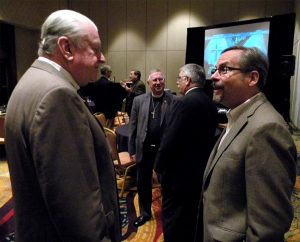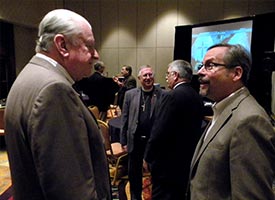SAN ANTONIO — The LCMS Council of Presidents (COP) and Board of Directors met together for a joint session here Nov. 21 — just as they have done for a number of years, in conjunction with their own separate meetings and the Lutheran Church Extension Fund (LCEF) Fall Leadership Conference.
The COP met Nov. 19-21 and the Board meeting was Nov. 21-22. The LCEF conference was Nov. 22-24.

The Rev. Dr. Larry Stoterau, president of the LCMS Pacific Southwest District and chairman of the Council of Presidents, told the COP and Board at the joint session that the council “has been working hard to respond to resolutions that were adopted by the [2013 Synod] convention — some of which relate directly to the COP, others to the Synod as a whole.”
He said that the COP has been divided into “study groups based on major themes that came out of the convention,” including “the whole topic of visitation — “the resolution which requires the president’s office, working with the vice-presidents, to visit every district in each triennium.”
Stoterau also said that groups of COP members are concentrating on the Koinonia Project, district viability, mission expansion and continuing education for workers.
In addition, he spoke of the COP’s continuous monitoring of pastoral vacancies.
Stoterau said that there is an increase in “the number of congregations that are no longer able to afford full-time pastors, and that number is growing rather quickly. … And so, we are attempting to find ways to support congregations that can’t afford full-time pastors.”
He also reported that since the COP’s September meeting, there have been 18 church plants and 11 church closures.
“The good news is that so far, since we started keeping track of it, we always have more new starts than closures.” He added that “more and more of those starts are non-English-speaking.
“This is an exciting thing, because we’re trying to reach across the cultural diversity in our districts and in our country today.”
“At the same time,” he said, “you have to understand that when an ethnic ministry starts, that’s not typically going to be the church that grows [dramatically] and gives strong financial support to the district or Synod.”
“That changes how we think about things financially,” Stoterau said.
Also at the joint meeting, Board of Directors Chairman Rev. Michael Kumm provided an update on the Wittenberg Project in Germany — overseen by the International Lutheran Society of Wittenberg (ILSW), which he chairs.
Kumm told the Board and COP members that demolition has started in preparation for reconstruction of the historic building in Wittenberg that will house programs of the project. He added that its “estimated completion and opening” are anticipated for May 2015 — two years ahead of the 500th anniversary of the Reformation, which had its start in Wittenberg.
The project’s building is expected to draw many of the visitors the city anticipates, in connection with that anniversary.
“We give thanks to God for that and for the contributions to make that possible,” said Kumm.
“This has been a great project and we’ve appreciated the wonderful joint effort with our SELK [Independent Evangelical Lutheran Church] partners in Germany,” Kumm said. Representatives of the LCMS, SELK and CPH serve on the ILSW board.
Kumm told the joint group that one goal of the LCMS Board of Directors for the new triennium is to “get a better understanding of our corporate international presence in the LCMS.”
He also reviewed the Board’s current make-up of 12 members, rather than its previous makeup of 15 members, and that it has the authority to appoint three additional members “for needed skill sets, if necessary.”
“One of the big differences” between the Council and the Board, Kumm said, is that “we have no mandates or instructions from the last convention.” He drew laughter from the group after adding, “And we are most grateful for that.”
“We have a wonderful group of people on the Board of Directors — from very wide and diverse backgrounds, all of them highly experienced in board-type activity,” Kumm concluded. “And for the last triennium — and I anticipate for the [current one] — a very conciliatory board that is truly working very hard for the good of the church at-large. So I thank them for their work.”
Concordia Plan Services President and CEO James F. Sanft also spoke at the joint COP-BOD session — on changes to the Concordia Retirement Plan that take effect July 1 and on health-care reform.
He said that after approval of the retirement plan changes in early 2013, Concordia Plan Services launched a comprehensive communication campaign about those changes to members and their employers in the plan.
“By-and-large,” Sanft said, “there has been a strong level of acceptance and even support on the part of our plan members that we serve, regarding the changes. … Our communication plans are not over, and will continue into 2014 and beyond, preserving the core and sustaining the plan for the future.”
Sanft spoke of “information changing constantly” in regard to health-care reform, with “significant marketplace confusion.”
Acknowledging that “the Affordable Care Act will have a significant impact on the Concordia Health Plan and how we do business,” he said the CPS board and staff “believe that the best strategy for 2014 is to stay the course.”
With such a “seamless transition for our ministries and workers from 2013 into 2014, they can know that if they’re participating in the Concordia Health Plan, they will be in full compliance with the applicable law and regulations,” Sanft said. “I believe that the Concordia Health Plan certainly will survive health-care reform and be even stronger.”
